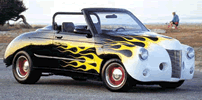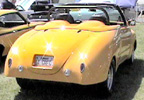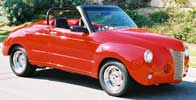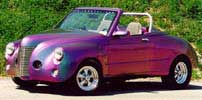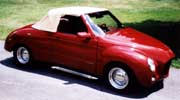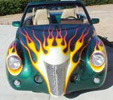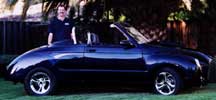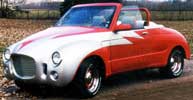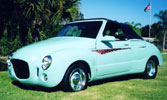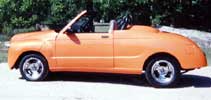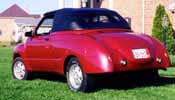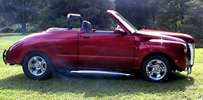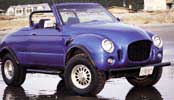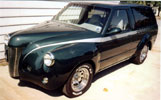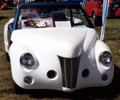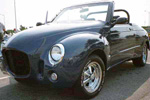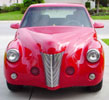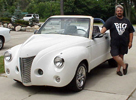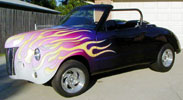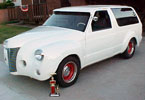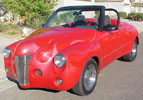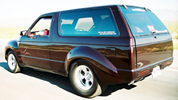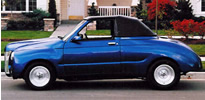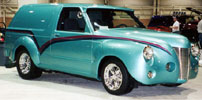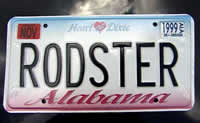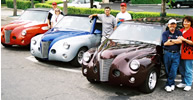| What
is the Rodster®?
© Copyright Caroselli.
No images or text located anywhere on this site may be reused
or republished without expressed written permission from Rodster,
Inc., d.b.a.: Caroselli Design. The Rodster Street Rod design
is protected by
U.S. Patent # D450,284.
"Rodster®" is a registered
trademark of Caroselli Design. |
What are owners saying about the Rodster® Street Rod?
A Few Words With BOB VENEZIA
Godeffroy, New York
So Henry tells me you've been building exotic cars for Mr. Druker for a while?
Yes, this is my third car for him.
What else have you built for him?
The first car I built for him... he wanted a car to go to the beach with and he found a Mini Mog on the island of Jamaica. I tried to search for a car like that. That was a car that was made in the Sixties by British Leland. I found a couple; they had used them on the island of Catalina. But they were all rotted and I convinced him that rather than spend our money on something that was thirty years old and restore it -- and it didn't work good thirty years ago -- we should get a Japanese car and I should make it into a beach car. So, after checking several chassis, I found that the Geo Metro or Suzuki was the type of body that I needed. I cut the roof off, I cut the doors down and made it into a car like on "Fantasy Island." We welded the bottom of the doors into the chassis and I remade the chassis for the car, and we reupholstered it; made a convertible top for it. That car was painted White Pearl with magenta accents. That was the first car I built for him, probably ten years ago. The next car I built for him... he had a SAAB that was a 900 Turbo convertible and he decided to hotrod it somewhat. So, we lowered the suspension, we had special wheels and tires, we got the best shocks we could get. I got springs from England, I got a stainless steel exhaust from somebody else. We put a new chip in it for the computer and rebuilt the entire drivetrain in the car. Lowered the trans, lowered it and that was the end of that project.
So is the Rodster your first kit car?
No, I've done several kit cars over my twenty-five years of fooling around. My first kit car I did was a car called a Valkyrie, a car based on a Volkswagen floor plan. I did a couple Cobras, and then I did a car called the Gatsby. A car that they originally sold as a Sceptre, I believe. The guy sold about fifteen of them and went out of business. And a guy in California, his name was Sky Clausen he bought the molds. He produced them for a while and I liked the way the car looked and I bought a body. We put it on a -- I think at the time it was a '77 Thunderbird chassis. When the car was finished, I eventually brought it down to Florida and eventually the car was sold to a guy in Belgium.
How does the Rodster compare with the other kit cars that you've done as far as ease of assembly?
For ease of assembly, the Rodster is by far the easiest to put together. Once you understand the drawings and stuff, it's very straightforward. There's not much fitting, which is where most people go... you know, fitting the doors, fitting this, fitting that. The trunk pretty much falls into place by itself. The doors -- because they're steel doors -- if you have to move them or do whatever you have to do, you can. The nose of the car is the only place where you have to do a little hand-fitting. So it's pretty straightforward.
How many hours do you think you spent on the conversion?
Well, you can't go by me because this particular car had a lot of things done to it that a regular Rodster doesn't get. My car was made into a four-seater because this guy has two children. All the rest of the Rodsters are only two-seaters. You know how he has a tonneau cover that covers what would be normally the backseat of a Blazer, it has those two humps in it? Okay. What I did was cut those two humps out, I made a mold to put fiberglass in, and I remolded the one edge that I cut out. And then I got a Jeep Wrangler seat and I made some brackets for it and I moved some of the stuff around so I could have it be the way I wanted and have enough room for someone to go in and out. On his car, he uses a cross-brace to hold the left and right, the B pillars of the car, the doorjambs, the part where the lock is. He uses a cross-brace to hold those two sides of the car at the right distance apart once you cut the roof off. I couldn't use the cross-brace because that's where you step through to get to the backseat. So I incorporated a B pillar reinforcement in the rollbar on both sides, and I made it so it was adjustable, so that if you didn't get it in exactly the right spot, you could bend the piece in and out by turning a screw to line the doors up properly. So, my car has a lot of other things. Also, the guy wanted his car to be stick. But I couldn't find a stick car that was everything I wanted. So I found this one. It had air, it had power this, power that, so I ended up buying it and taking it apart to convert it into a stick. So I can't really tell you in hours. My car is so much different from the rest of them.
Suppose someone didn't do all these extra things to it. Judging from the manual and the basic stuff that you have to do to build a Rodster, do you think that it's within the realm of a non-professional car guy?
Absolutely. Absolutely. It's just got to be a guy who has a smidgen of common sense. You know, he can be a guy who works with wood. It has to be a guy who's relatively handy. You couldn't take somebody who has no mechanical skills. It's not that they couldn't do it, but it would take them forever. As a matter of fact, I've just seen a guy in Pennsylvania who built one last year and he's not a body guy by any means. He did all the mechanical work himself. His car is as good as any. And the car was very straightforward, he did a real nice job, and like he said, "You know, I'm not a body guy."
Would that have been Bob Schoedler?
Yeah.
We've got a lot of pictures of his car on the website. He's really enjoying it a lot.
Yeah, he is. I went to a car show Sunday, and the car was there, but I couldn't find him. I waited a couple of hours, did the rest of the show, I came back and he still wasn't there. And then I had to leave, so I never really got to speak to him personally. I just talked to him once on the phone because he had made a convertible top for the Rodsters. I'm making one for Druker's car and I wanted to look at what he did. He did a pretty nice job. I'm going to start, I guess, Druker's car in two weeks. I'll be taking his car back to put a convertible top on it.
Did you do everything yourself?
Pretty much everything, except for the upholstery. I have a guy that I've worked with for twenty years on various projects. Had him do the beach car for me. I pretty much send him whatever I do, being that we're on the same wavelength with regards to what something should be when it's finished. He sews excellent, all his seams are straight, always does a nice job, and he and I get along relatively well, you know. I can say, "Hey, I want it like this" or "No, that's not good." You know what I'm saying? I give him enough work. I generally come in with a sketch of what I want it to be and we take it from there. My car also has a full interior. It has two front seats, back seats. But what I did was... all these people, 90% of them, are using the Blazer or Jimmy interior, okay? Because that interior has -- in the gray version, anyway, which is the one I was working with -- about four different shades of gray in there. They wanted to take this car to Florida; they wanted a white interior. I couldn't do a white interior because there were too many shades of gray. So what I ended up doing was, I took a dark gray, what they call a porpoise gray, and to the outside of the seat and the center where your back and your butt would touch, made a much lighter gray. And those grays are on the dashboard and on the door panels. I also reupholstered -- on most of the Blazer door panels, depending on year, there's a little spot of interior where your elbow would rest. I took that off. I made that into an arrow pattern, which is what the whole interior of this car is. It's like two inch pleats going towards a point. And we did the whole interior like that, so everything matched.
Sounds great. Is Mr. Druker going to be showing this car?
This guy is not into... he's a car guy. He's a driver, you know what I mean? He's not into going to the car show and sitting there for five hours. He's into driving the car. His only complaint about the car is that he can't go anywhere with it, because wherever it is, there's like a hundred people on him! We painted the car candy apple red. I have to say -- and not because I did it -- the paint came out really good. I mean, you can't look at the thing in the sunlight -- it just glows. It came out very nice all around. The gray interior, the candy apple red exterior. I put small nerf bars on the back to give him a little bumper protection. And also, he wanted sidepipes, so we put sidepipes on the car, exactly like the ones that guy bought in Pennsylvania and put on. Both of these cars are kind of the same. Mine has the other nose on it; mine has the old Ford-looking nose and his has the Cobra-type nose, the mouth-type nose. But actually, the colors -- I think he painted his Cayenne Red, a SAAB color. It's slightly orangeyer than Candy Apple Red, but it's a two-stage paint, as well. So the cars look very similar.
Let me ask you about the process. Did you enjoy putting it together?
I'm kind of beyond that.
That's more for the hobbyist?
Yeah. That's for a guy who's doing this for the first time. Henry was a very nice guy; I had a couple of problems. Everybody has a different train of thought for things, you know. I had a couple of problems, a couple of questions. Henry was cool. You call him up, say, "Henry, this is what's going on..." "Okay, do this, do that," you know. So that was very nice. He was always helpful; he was always knowledgeable. Which a lot of times when you buy a kit car, you can't get that.
I've heard that. Did you get the kit on time?
Yeah. Not only that, but I don't think you'll find -- like I said, I've been doing this a long time -- I don't think you'll find anybody who packs the thing like he did. Which is really important, because there's nothing worse than having your stuff get halfway -- you know, 3,000 miles over here -- to find out something's broken. So, that is something to be considered. It was shipped in a timely fashion. There was one piece -- the lowering blocks were supposed to be a certain size. It was supposed to be 3 inch ones. I got 4 inch ones and I didn't want them. I called him up and Henry was like, "Hey, go out and buy another set, send me the bill and I'll pay you." To me, Henry's a pretty straight-up kind of guy. I like him.
That's great. As far as the kit, what did you think of the fiberglass parts?
The 'glass itself was pretty good. We had a couple of gel pops. That's on an individual basis. As they're making the mold, the first thing the guy does is he sprays gel coat in the mold. And then he starts to put the fiberglass in on top of that. If they don't roll the fiberglass good into the gel coat, there's a little air pocket, and when you go to sand it, that breaks through, and now you have a big hole and you have to fill it. So, there were a couple of gel pops on the car, but for my two cents, nothing bad. I've done kits where the right and left side are completely different.
What did you think of the fit of the Rodster parts to the donor car?
They fit well. They absolutely did fit well. Personally, I would have liked maybe bigger pictures in his assembly manual. Maybe some of the stuff was copied too many times and wasn't so clear. You know, I'm fifty-something years old, I need big pictures nowadays. But, like I said, I changed a couple of things, simply because I've done this numerous times, okay? Not this particular car, but I've done plenty of cars, so I changed things to suit what I know is the correct way. But, as far as I'm concerned, Henry's stuff is a quality item. Everything fit pretty nice. And the end product speaks for itself. When you find out that a guy sold, say, 500 kits, and then you find out there's only fifty of them together, right there you know what the problem is. There's always a certain amount of kits that don't get put together for one reason -- you know, divorce, the guy ran out of money, whatever the story might be. But when you find the guy sold like 300 kits and only fifty of them got put together, you know there's a reason why. And I'm sure if you go and call everybody that Henry sold the car to, I'm sure all of his cars are done. And that, you won't find from everybody.
Interesting point.
It's okay to sell them and a guy buys them, but that doesn't mean... you know what I'm saying? As a matter of fact, Druker called me earlier today and left a message. He thinks he has somebody that's seen the car that wants one. With the beach car, I can't tell you how many people called me up for the beach car. If I had three customers like him, I would stay home. I would have so much work, I couldn't do it all. He's one of those kinds of guys.
Other than the photos in the manual, were the instructions clear?
Yeah. Like I said, everyone has a different train of thought. I think I called him only two or three times to clarify certain things. You could write a technical manual and some people never get it. You know what I'm saying? But I thought his manual was very straightforward. If you followed it step-by-step as he suggested, the process went along relatively smoothly.
I wanted to ask you about the donor car. What year was it, what kind of motor, all that stuff?
The donor car... I wouldn't let anybody buy one unless it had a 4.3 motor in it. That didn't start till '88, I believe. So you had to have one that's '88 or later. I found a 1990 which had 107,000 miles on it. It was automatic, air conditioned, two-wheel drive, and I paid $3,000 for it.
How much total is invested?
In Jim's car, I put about, I believe, $20,000 in parts. That was just in parts. That included paint and included materials. That includes the donor car and the kit. That includes everything except my labor.
That includes the conversion to stick and jump seat, too?
Jump seat, stick, making it into a four-seater, making the convertible top for it. I went over the whole car. I replaced the water pump, alternator, all the ball joints, all the brake rotors, axle seals, driveshaft u-joints. When I go through a car, I go through it. And that's why the amount is so much money. But, if you drive his car, it feels like a new car now.
How does driving it feel to you?
It's very cool. As much as I thought it would just be nice to look at and it would drive poorly, the thing drives excellent. It drives excellent! I've owned Corvettes my whole life. I've had all kinds of cars. I drive a lot of cars, everything from Jaguars, Porsches, you name it, I've driven them. This car goes around a corner real nice. With the stick, and once you lower the suspension, it goes around the corner really good. And Druker is a very fast driver. His normal cruising speed is about 75, this guy. He'll even tell you, it's like, wow this thing is really nice.
How does it feel inside? Is it comfortable?
Like I said, my interior is a little different. I redid the seats. As far as vision over the hood and turning around and seeing, yeah, it's pretty good. I have no problem with that.
So, would you recommend the Rodster to other people?
Oh, absolutely! Absolutely!
What do you think is the best thing about it?
I guess for a guy to do this with his son, or something like that -- I think the fact that you can do it in a one-car garage with a minimum amount of tools, I think that says something for it. You don't have to have a machine shop full of junk to do this.
Is there anything else you want to say about the car?
I think, like I said, the few customers that I've talked to, everybody's happy with their car. That, to me, says more than anything that Henry says in his brochure. These are the guys who are actually using them. You know what I'm saying? So, like my guy, if you talk to Jim Druker, I think he'll tell you the same thing. He'll tell you, "Wow, the car is really cool. I'm having the best time of my life with it!"
